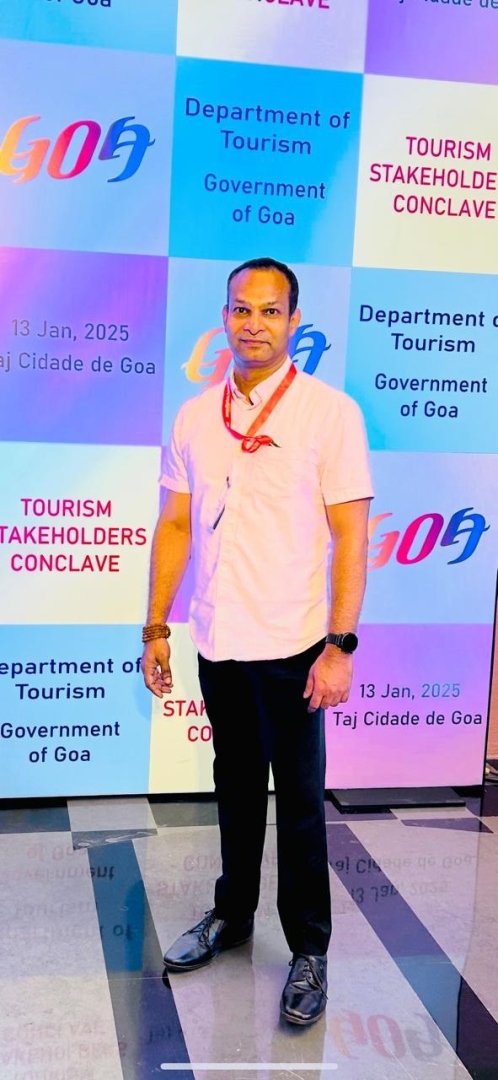
PANAJI
Antonio F Ferrao showed a noticeable limp when he was just 20 months old. Doctors later diagnosed it as a locomotor disability, affecting 42% of his left leg. The youngest of four siblings, Antonio grew up in Marcel surrounded by a loving and supportive family who always saw his potential beyond the disability. With their encouragement, he not only kept pace with his peers but often outshone them—excelling in academics and showing grit in physical activities. Teachers admired his brilliance and motivated him to aim high, proving that disability was no barrier to success.
Today, Antonio is recognised as a dynamic professional with wide experience in business development, banking, and insurance. He also works in research, planning, and sustainable practices. He holds a postgraduate degree in Business Administration and a postgraduate diploma in Applied Statistics from Goa University. His BA in Economics laid a strong foundation to achieve organisational goals. But his journey was far from easy.
Though he consistently excelled in academics, after graduation he faced rejection after rejection. Employers often looked past his achievements and focused only on his disability. “It was a wake-up call,” he recalls. Refusing to give up, Antonio took a demanding field sales job with a telecom company in Ponda while pursuing a part-time master’s degree in Business Administration. Those years shaped his resilience. He later joined ICICI Bank as a direct selling associate for car loans, before entering government service in 2007.
As a gazetted officer, Antonio has contributed to departments including Planning and Statistics, Art and Culture, Higher Education, and now Tourism. At the Department of Tourism, where he currently works as a research assistant, he studies tourist demographics and analyses data to strengthen Goa’s sustainable tourism strategy.
Earlier, at the Directorate of Higher Education, he worked for seven years as a research assistant/junior consultant. There, he ensured 100% data upload of all Higher Education Institutions on the AISHE portal for five consecutive years—a major achievement for both him and the State. He also coordinated programmes to improve access to higher education and used statistical tools to assess outcomes.
At the Directorate of Art and Culture, Antonio served as a statistical assistant, helping to organise cultural events and develop programmes that encouraged awareness of Goa’s artistic and cultural heritage. He also managed documentation and reports for cultural projects.
At the Directorate of Planning and Statistics, he worked as an investigator/statistical assistant, conducting surveys and statistical studies to guide state policies and planning.
Before his government career, Antonio worked as a direct selling associate with ICICI Bank, where he advised clients and achieved sales targets in car loans. He also worked as a business development executive at Shree Electronics, where he identified new business opportunities and built strong client relationships.
Outside of work, he enjoys music, experimenting with healthy recipes, practising yoga, and writing blogs on sustainability, fitness, and lifestyle. Dedicated to personal fitness, he promotes healthy living and believes in natural, holistic approaches to physical and mental wellbeing.
Antonio also speaks strongly about the need for a shift in society’s mindset towards persons with disabilities (PwDs). “Committees formed to address disability issues often exclude the very people they are meant to serve. Policies must involve PwDs from the start,” he says. In Goa alone, an estimated 2,000 PwDs actively drive cars, yet parking spaces with proper accessibility and signage remain scarce.
He believes technology can be a game-changer, from prosthetics to assistive devices that boost independence. However, many PwDs are unaware of such tools or cannot afford them. Antonio suggests that the government should create a clear plan to make these devices accessible, supported by a state-wide census to map the exact number and needs of PwDs. He sees hope in the recently formed Directorate of Empowerment for Persons with Disabilities in Goa.
Yet, stigma and stereotypes remain. Disability is too often seen through a charity or medical lens, where PwDs are “helped” instead of being empowered. Antonio is determined to change this narrative, calling for empathy to replace bias. His journey shows that the greatest victories are not only in overcoming obstacles but also in inspiring others to rise above them.